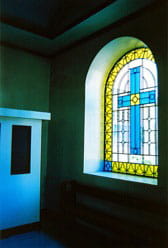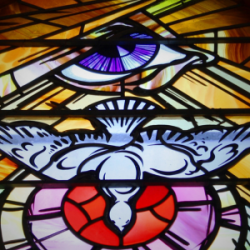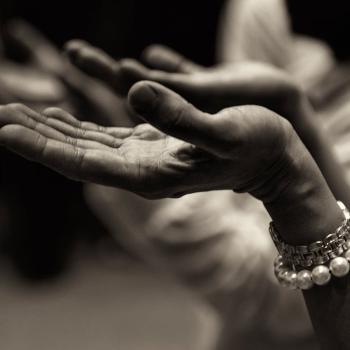
 "Bless me, Father, for I have sinned." So begins exciting adventures in the confessional, the little room where Catholics go to confess their sins to a priest. You know the one, you've seen it in a million movies: a small darkened room with a priest on one side, a repentant sinner on the other and a little screen between them for anonymity. It makes for nice footage on the silver screen, but personally I've never been in a confessional that had anything like the mood lighting of Hollywood's version, and while the screen is there if you want to go for that anonymous feel, most churches now also have a table where you can sit down in a chair facing the priest.
"Bless me, Father, for I have sinned." So begins exciting adventures in the confessional, the little room where Catholics go to confess their sins to a priest. You know the one, you've seen it in a million movies: a small darkened room with a priest on one side, a repentant sinner on the other and a little screen between them for anonymity. It makes for nice footage on the silver screen, but personally I've never been in a confessional that had anything like the mood lighting of Hollywood's version, and while the screen is there if you want to go for that anonymous feel, most churches now also have a table where you can sit down in a chair facing the priest.
Christians in the early Church only confessed once, right before they were baptized; now that they were spiritually shiny with a new life in Christ, they wouldn't need to confess anymore, right? Um, well...It didn't take long for that idea to fall through when Christian communities saw believers commit some big bad sins, like denying Christ during the persecutions. The Church settled on confession as a way to repair broken relationships and help renew the Christian's commitment to Christ. But don't be thinking mood lighting and screens here: you had to stand up in front of the whole church to admit your sin and then go through a long (like, years) public penance before you would be a Christian in good standing again. God's forgiveness may be immediate, but the humans who made up the Church took a little more convincing.
As Christians began to think of God as a king with divine laws that could easily be broken, their understanding of sin changed from just the Really Big Stuff to the smaller moments of falling away from perfect action. And if you've got more sins to worry about, then you've got more things to confess. Celtic monks began private confession and their missionaries carted the practice all over Europe. Monks and nuns would confess to someone else in their community, and then layfolk started confessing to monks and nuns, the whole idea being that the person hearing your confession would reassure you of God's love and forgiveness. By about 1215, though, the idea of absolution -- of a human actually being able to forgive sins in God's name -- had come into play, and absolution required an ordained priest. Confession had become not just a Christian practice, but a central sacrament of the Church.
You might hear Catholics talk about going to confession, doing penance, or receiving reconciliation; those are just different terms for the same sacrament. Once you've confessed, the priest normally gives you a penance to perform, like saying certain prayers, to show that you've repented. Nowadays the term "reconciliation" is popular, because that's what it's really all about: reconciling people with God, with those they've harmed, and with themselves.
So if you know you can go to confession and get absolved, doesn't that kind of give you a "Get Out of Jail Free" card for sinning? Just go ahead and do it since you can always repent of it later, right? Yeah, but that's not how it works. Confession and absolution require actual repentance, which means a change of heart and remorse for what you've done; just saying the words doesn't cut it. Guido da Montefeltro in Dante's Inferno found that out the hard way: Pope Boniface VIII gets Guido to commit a sin by giving him absolution in advance, so when Guido dies he's surprised that a demon shows up to cart him off to hell for his sin. "No one can repent and will a thing at once," his demon jailer tells him -- you can't repent of something before you do it, and no repentance means no absolution.
Read earlier installments of "Catholics Do This but They Don't Do That":
#1 - Pray the Rosary
#2 - Make the Sign of the Cross
#3 - Genuflect
Want to know about a particular Catholic practice? Ask "Catholics Do This But They Don't Do That" in the comment section below and watch for your topic to show up in weeks to come.
9/18/2009 4:00:00 AM




